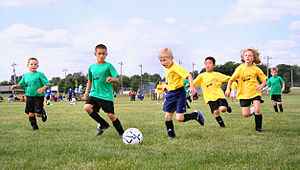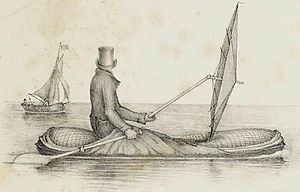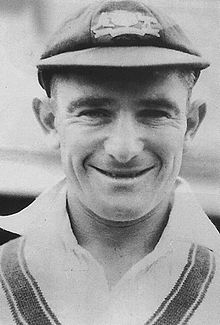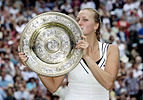The Sports Portal

Sport is a form of physical activity or game. Often competitive and organized, sports use, maintain, or improve physical ability and skills. They also provide enjoyment to participants and, in some cases, entertainment to spectators. Many sports exist, with different participant numbers, some are done by a single person with others being done by hundreds. Most sports take place either in teams or competing as individuals. Some sports allow a "tie" or "draw", in which there is no single winner; others provide tie-breaking methods to ensure one winner. A number of contests may be arranged in a tournament format, producing a champion. Many sports leagues make an annual champion by arranging games in a regular sports season, followed in some cases by playoffs.
Sport is generally recognised as system of activities based in physical athleticism or physical dexterity, with major competitions admitting only sports meeting this definition. Some organisations, such as the Council of Europe, preclude activities without any physical element from classification as sports. However, a number of competitive, but non-physical, activities claim recognition as mind sports. The International Olympic Committee who oversee the Olympic Games recognises both chess and bridge as sports. SportAccord, the international sports federation association, recognises five non-physical sports: bridge, chess, draughts, Go and xiangqi. However, they limit the number of mind games which can be admitted as sports. Sport is usually governed by a set of rules or customs, which serve to ensure fair competition. Winning can be determined by physical events such as scoring goals or crossing a line first. It can also be determined by judges who are scoring elements of the sporting performance, including objective or subjective measures such as technical performance or artistic impression. (Full article...)
Selected articles
Selected pictures
Did you know...
- ...that Ed Brown was an African-American slave who rose to become a Belmont Stakes-winning jockey and a Kentucky Derby-winning horse trainer?
- ...that Bearcat Stadium (pictured) of Northwest Missouri State University, originally opened in 1917, is the oldest stadium of any NCAA Division II school?
- ...that Australian sprinter Stanley Rowley is the only Olympic participant to win medals for two countries at the same Olympic Games?
- ...that Battlefield Baseball, a Japanese film, features elements of the sports, martial arts and horror genres, as well as including three musical numbers?
- ...that whipcracking, the art of using a whip to create a miniature sonic boom, is a competitive sport in Australia, where it was also elaborated into whipboxing?
Selected quote
Selected athlete
Subedar Abdul Khaliq (Punjabi, Urdu: عبد الخالق; 23 March 1933 – 10 March 1988), also known as Parinda-e-Asia (Urdu for The Flying Bird of Asia), was a Pakistani sprinter from 8 Medium Regiment Artillery who won 36 international gold medals, 15 international silver medals, and 12 International bronze medals while representing Pakistan. He competed in the 100m, 200m, and 4 x 100 meters relay. He participated in the 1956 Melbourne Olympics and the 1960 Rome Olympics. He also participated in the 1954 Asian Games and the 1958 Asian Games. During the 1956 Indo-Pak Meet held in Delhi, Abdul Khaliq was first referred to as "The Flying Bird of Asia" by the Prime Minister of India of the time was Jawaharlal Nehru, who was reportedly captivated by his performance during the event. (Full article...) (Full article...)
Selected team
Rugby was introduced to France in 1872 by the British, and on New Year's Day 1906 the national side played its first Test match — against New Zealand in Paris. France played sporadically against the Home Nations until they joined them to form a Five Nations tournament (now the Six Nations Championship) in 1910. France also competed in the rugby competitions at early Summer Olympics, winning the gold medal in 1900 and two silver medals in the 1920s. The national team came of age during the 1950s and 1960s, winning their first Five Nations title outright in 1959. They won their first Grand Slam in 1968.
Since the inaugural World Cup in 1987, France have qualified for the knock-out stage of every tournament. They have reached the final three times, losing to the All Blacks in 1987 and 2011 and to Australia in 1999. France hosted the 2007 Rugby World Cup, where, as in 2003, they were beaten in the semi-finals by England.
French international matches are played at several venues across the country; the Stade de France in the Paris suburb of Saint-Denis is used for their games during the Six Nations, and they have a formidable home record at the Stade Vélodrome in Marseille where they have only lost twice, to Argentina in 2004 and to New Zealand in 2009. (Full article...)
In this month
- July 9, 1877 – The Championships, Wimbledon (2011 Ladies' Singles champion pictured), the oldest of the four tennis Grand Slam tournaments, holds its first event
- July 18, 1965 – The first All-Africa Games multi-sport event begins in Brazzaville, Republic of the Congo
- July 19, 1908 – The organizing body for international aquatic sports competitions, Fédération Internationale de Natation, is founded following the conclusion of the 1908 Summer Olympics
- July 20, 1986 – The first Special Olympics World Games takes place in Chicago, United States
- July 30, 2004 – The inaugural Women's Baseball World Cup begins in Edmonton, Canada
Topics
Related portals
Categories
Things you can do
 |
Here are some tasks awaiting attention:
|
Associated Wikimedia
The following Wikimedia Foundation sister projects provide more on this subject:
-
Commons
Free media repository -
Wikibooks
Free textbooks and manuals -
Wikidata
Free knowledge base -
Wikinews
Free-content news -
Wikiquote
Collection of quotations -
Wikisource
Free-content library -
Wikiversity
Free learning tools -
Wiktionary
Dictionary and thesaurus


























































